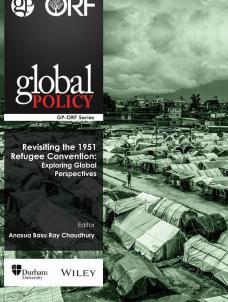
The 1951 Convention Relating to the Status of Refugees was the first comprehensive attempt to define refugees and charted a detailed guideline for host countries to ensure the adequate protection and preservation of the rights of all refugees. The document was initially limited in its temporal and spatial scope as it covered the period before 1 January 1951 and confined its mandate to European refugees. The 1967 Protocol Relating to the Status of Refugees expanded the Convention’s scope, making it the most relevant international legal regime for addressing the contemporary global refugee crisis.
This volume revisits the relevance of the 1951 Convention in today’s world. To mark the significance of this important document, the essays in this compendium analyse various dimensions of the universal refugee protection regime. The volume is divided into three segments—Understanding the Relevance of the 1951 Convention; Refugee Protections and Local Geographies; and the Rohingya: Precarities of a Stateless People—to include perspectives from diverse geographies (South Asia, Middle East, Africa, Europe, and Australia) and various aspects of the global refugee protection framework. This compilation aims to be a valuable addition to the current debate on the relevance of universal refugee protection regimes.
To download the volume for Kindle or Epub readers please click here. For the Pdf please click here.
Contents
Introduction
Understanding the Relevance of the 1951 Convention
- The Test of Time: Reconceiving the Limitations of the 1951 Refugee Convention by Sabyasachi Basu Ray Chaudhury
- Impact of Regional Interventions on Global Refugee Law: Assessing the Kolkata Declaration by Nergis Canefe
Refugee Protections and Local Geographies
- Law and Politics of Refugee Protection in South Asia by Shuvro Prosun Sarker
- Understanding India’s Refugee Policy and the Need for an Institutionalised Approach by Ambar Kumar Ghosh
- Analysing the Precarity and Marginalisation of the Lhotshampa Refugees by Rajesh S. Kharat
- India and the Sri Lankan Tamil Refugee Issue by K.M. Parivelan
- Syrian Refugees in Jordan: Between Economic Precarity and Legal Vulnerability by Wa’ed Alshoubaki
- Waiting for Third Country Resettlement: Exploring Temporal (Im)Mobility for Syrian Refugees in Jordan by Hanna Berg
- Decoding Africa’s Legal Protection Mechanisms for Refugee by Letlhokwa George Mpedi
- Revisiting Freedom of Trade, Occupation, and Movement of Refugees in South Africa by Letlhokwa George Mpedi and Theophilus Coleman
- Securitisation of European Asylum and Migration Policies Continues to Escalate by Emily Venturi
- Refugee Protection in the 21st Century: An Australian Perspective by William Maley
The Rohingya: Precarities of a Stateless People
- Rohingya Women and Children in Bangladesh and the Limits of Legal Protection Regimes by Amena Mohsin and Nahian Reza Sabriet
- Fallacies of Protection: Statelessness, Law, and the Rohingya in South Asia by Sucharita Sengupta
- Continued Insecurity of Rohingya in Bangladesh’s Bhasan Char by Sreeparna Banerjee
About the Editor and Authors